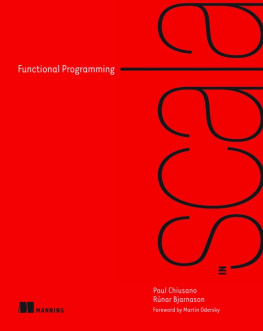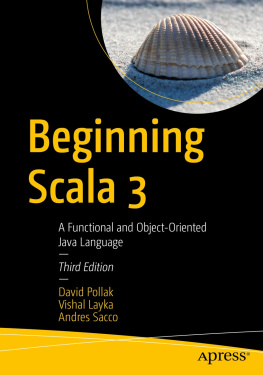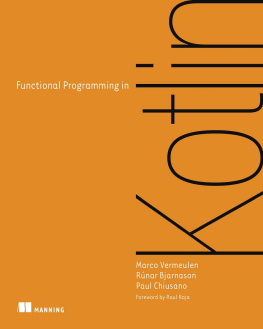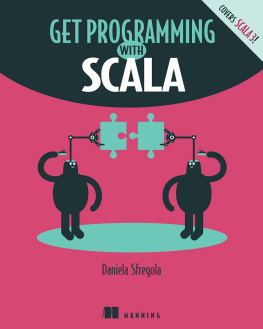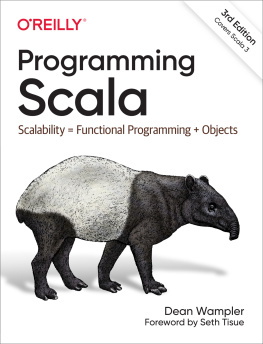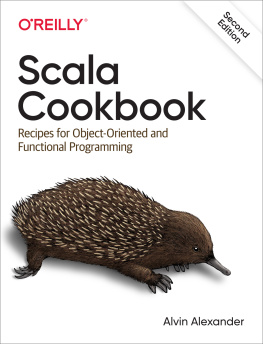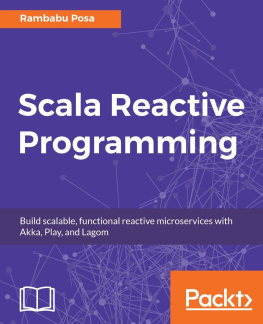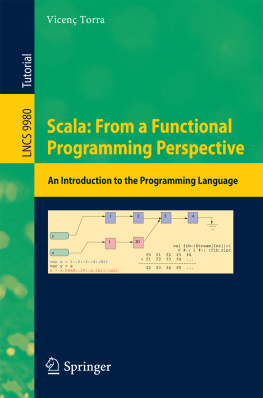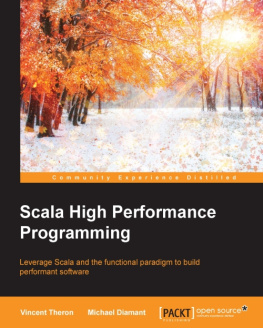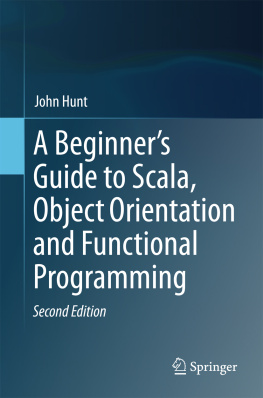Paul Chiusano Rúnar Bjarnason - Functional Programming in Scala
Here you can read online Paul Chiusano Rúnar Bjarnason - Functional Programming in Scala full text of the book (entire story) in english for free. Download pdf and epub, get meaning, cover and reviews about this ebook. publisher: Manning Publications, genre: Computer. Description of the work, (preface) as well as reviews are available. Best literature library LitArk.com created for fans of good reading and offers a wide selection of genres:
Romance novel
Science fiction
Adventure
Detective
Science
History
Home and family
Prose
Art
Politics
Computer
Non-fiction
Religion
Business
Children
Humor
Choose a favorite category and find really read worthwhile books. Enjoy immersion in the world of imagination, feel the emotions of the characters or learn something new for yourself, make an fascinating discovery.
- Book:Functional Programming in Scala
- Author:
- Publisher:Manning Publications
- Genre:
- Rating:3 / 5
- Favourites:Add to favourites
- Your mark:
- 60
- 1
- 2
- 3
- 4
- 5
Functional Programming in Scala: summary, description and annotation
We offer to read an annotation, description, summary or preface (depends on what the author of the book "Functional Programming in Scala" wrote himself). If you haven't found the necessary information about the book — write in the comments, we will try to find it.
Functional Programming in Scala — read online for free the complete book (whole text) full work
Below is the text of the book, divided by pages. System saving the place of the last page read, allows you to conveniently read the book "Functional Programming in Scala" online for free, without having to search again every time where you left off. Put a bookmark, and you can go to the page where you finished reading at any time.
Font size:
Interval:
Bookmark:

For online information and ordering of this and other Manning books, please visit www.manning.com. The publisher offers discounts on this book when ordered in quantity. For more information, please contact
Special Sales Department Manning Publications Co. 20 Baldwin Road PO Box 761 Shelter Island, NY 11964 Email: orders@manning.com2015 by Manning Publications Co. All rights reserved.
No part of this publication may be reproduced, stored in a retrieval system, or transmitted, in any form or by means electronic, mechanical, photocopying, or otherwise, without prior written permission of the publisher.
Many of the designations used by manufacturers and sellers to distinguish their products are claimed as trademarks. Where those designations appear in the book, and Manning Publications was aware of a trademark claim, the designations have been printed in initial caps or all caps.
 Recognizing the importance of preserving what has been written, it is Mannings policy to have the books we publish printed on acid-free paper, and we exert our best efforts to that end. Recognizing also our responsibility to conserve the resources of our planet, Manning books are printed on paper that is at least 15 percent recycled and processed without the use of elemental chlorine.
Recognizing the importance of preserving what has been written, it is Mannings policy to have the books we publish printed on acid-free paper, and we exert our best efforts to that end. Recognizing also our responsibility to conserve the resources of our planet, Manning books are printed on paper that is at least 15 percent recycled and processed without the use of elemental chlorine.
 | Manning Publications Co.20 Baldwin RoadPO Box 261Shelter Island, NY 11964 | Development editor: Jeff BleielCopyeditor: Benjamin BergProofreader: Katie TennantProject editor: Janet VailTypesetter: Dottie MarsicoIllustrator: Chuck LarsonCover designer: Irene Scala |
ISBN 9781617290657
Printed in the United States of America
1 2 3 4 5 6 7 8 9 10 EBM 19 18 17 16 15 14
Functional Programming in Scala is an intriguing title. After all, Scala is generally called a functional programming language and there are dozens of books about Scala on the market. Are all these other books missing the functional aspects of the language? To answer the question its instructive to dig a bit deeper. What is functional programming? For me, its simply an alias for programming with functions, that is, a programming style that puts the focus on the functions in a program. What are functions? Here, we find a larger spectrum of definitions. While one definition often admits functions that may have side effects in addition to returning a result, pure functional programming restricts functions to be as they are in mathematics: binary relations that map arguments to results.
Scala is an impure functional programming language in that it admits impure as well as pure functions, and in that it does not try to distinguish between these categories by using different syntax or giving them different types. It shares this property with most other functional languages. It would be nice if we could distinguish pure and impure functions in Scala, but I believe we have not yet found a way to do so that is lightweight and flexible enough to be added to Scala without hesitation.
To be sure, Scala programmers are generally encouraged to use pure functions. Side effects such as mutation, I/O, or use of exceptions are not ruled out, and they can indeed come in quite handy sometimes, be it for reasons of interoperability, efficiency, or convenience. But overusing side effects is generally not considered good style by experts. Nevertheless, since impure programs are possible and even convenient to write in Scala, there is a temptation for programmers coming from a more imperative background to keep their style and not make the necessary effort to adapt to the functional mindset. In fact, its quite possible to write Scala as if it were Java without the semicolons.
So to properly learn functional programming in Scala, should one make a detour via a pure functional language such as Haskell? Any argument in favor of this approach has been severely weakened by the appearance of Functional Programming in Scala.
What Paul and Rnar do, put simply, is treat Scala as a pure functional programming language. Mutable variables, exceptions, classical input/output, and all other traces of impurity are eliminated. If you wonder how one can write useful programs without any of these conveniences, you need to read the book. Building up from first principles and extending all the way to incremental input and output, they demonstrate that, indeed, one can express every concept using only pure functions. And they show that it is not only possible, but that it also leads to beautiful code and deep insights into the nature of computation.
The book is challenging, both because it demands attention to detail and because it might challenge the way you think about programming. By reading the book and doing the recommended exercises, you will develop a better appreciation of what pure functional programming is, what it can express, and what its benefits are.
What I particularly liked about the book is that it is self-contained. It starts with the simplest possible expressions and every abstraction is explained in detail before further abstractions are built on them in turn. In a sense, the book develops an alternative Scala universe, where mutable state does not exist and all functions are pure. Commonly used Scala libraries tend to deviate a bit from this ideal; often they are based on a partly imperative implementation with a (mostly) functional interface. That Scala allows the encapsulation of mutable state in a functional interface is, in my opinion, one of its strengths. But it is a capability that is also often misused. If you find yourself using it too often, Functional Programming in Scala is a powerful antidote.
M ARTIN O DERSKY
C REATOR OF S CALA
Writing good software is hard. After years of struggling with other approaches, both of us discovered and fell in love with functional programming (FP). Though the FP approach is different, we came to appreciate how the discipline leads to a coherent, composable, and beautiful way of writing programs.
Both of us participated in the Boston Area Scala Enthusiasts, a group that met regularly in Cambridge. When the group first started, it mainly consisted of Java programmers who were looking for something better. Many expressed frustration that there wasnt a clear way to learn how to take advantage of FP in Scala. We could empathizewe had both learned FP somewhat haphazardly, by writing lots of functional code, talking to and learning from other Scala and Haskell programmers, and reading a patchwork of different articles, blog posts, and books. It felt like there should be an easier way. In April 2010 one of the groups organizers, Nermin erifovi, suggested that we write a book specifically on the topic of FP in Scala. Based on our learning experiences, we had a clear idea of the kind of book we wanted to write, and we thought it would be quick and easy. More than four years later, we think we have created a good book. Its the book we wish had existed when we were learning functional programming.
We hope to convey in this book some of the excitement that we felt when we were first discovering FP.
We would like to thank the many people who participated in the creation of this book. To Nermin erifovi, our friend from the Boston Scala group, thank you for first planting the seed of this book in our minds.
Font size:
Interval:
Bookmark:
Similar books «Functional Programming in Scala»
Look at similar books to Functional Programming in Scala. We have selected literature similar in name and meaning in the hope of providing readers with more options to find new, interesting, not yet read works.
Discussion, reviews of the book Functional Programming in Scala and just readers' own opinions. Leave your comments, write what you think about the work, its meaning or the main characters. Specify what exactly you liked and what you didn't like, and why you think so.

